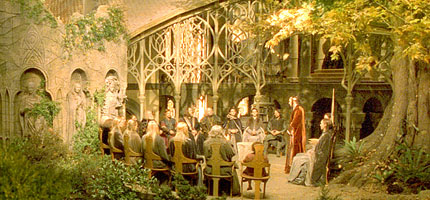The Power of We
In tomorrow's Gospel reading four friends lower a paralytic man through the roof to get him to Jesus for healing. Rather than seeming to notice either the hole they tore in the roof, or the paralysis, Jesus tells the man his sins are forgiven. What sins? The hole in the roof? The other guys did that.
In a sermon on this passage three years ago called The Power of We, I used a video clip from The Lord of the Rings and pointed out that
Frank+
The Rev. Frank Logue, Pastor + King of Peace Episcopal Church

In a sermon on this passage three years ago called The Power of We, I used a video clip from The Lord of the Rings and pointed out that
The group seeks out Jesus, convinced that he can help their helpless friend. Not only do they get him to Jesus, but it is the group’s faith that Jesus recognizes. The paralyzed man’s faith may or may not have been part of the faith of the group. He had some faith, or he would never have tried to follow Jesus’ directions and stand. But the real faith in this story is the faith of a group. It is the power of we.peace,Just like in the Lord of the Rings, there are things that I cannot do on my own. To apply the lesson of the quest from our video clip to more spiritual matters, I may not have the faith to pray for healing, but we can. I may not have the faith to see past obstacles in my way, but we do. I may not have the faith to say that I believe, but we have the faith.
I think that is why it is so important that the Nicene Creed uses the word “we.” We will recite the Nicene Creed in just moment as we do most Sundays of the church year and as we say the words, you will not say, “I believe,” but rather “we believe.”
If you don’t have the faith to recite the creed, don’t stay home feeling like coming to church will force you to be a fraud. Come, stand with us and say, “We believe.” Of course, you could also just listen as others recite the words. That is perfectly fine. Even if you don’t have the faith to believe part of the creed or any of the creed, that’s OK, we do. We believe in God. We believe in one lord Jesus Christ. We believe in the Holy Spirit. We believe in the Trinity, a community of divine persons who is willing to draw you into that divine life even in your doubts as you join us in saying “We believe.”
Christianity is not a solo sport. Even a hermit living off in a cave somewhere is connected to the rest of us and as Christians we know celebrate that essential connectedness among people. That’s why it is crucial to gather with other Christians. That’s why you need a community of faith to support you. We can mourn with you in grief. We can rejoice with you in times of celebration. We can hold you up and have the faith that you can’t have on your own in times of doubt.
Frank+
The Rev. Frank Logue, Pastor + King of Peace Episcopal Church








2 Comments:
At 2/17/2006 10:56 PM, Anonymous said…
Anonymous said…
As someone who was raised in a non-liturgical protestant church, I find comfort in the "we" of the liturgical experience. While others I know find the repetition of liturgy week after week uninspiring, I find the sameness of the liturgy comforting like an anchor. No matter what I feel like inside, I can come to church and be surrounded by "I believe in one God, the Father Almighty, creator of heaven and earth" and I know that my own feelings and emotions are just that. They are just mine. God's power does not depend on how I feel. Being surrounded by the community and connected to them at a simple level of a statement of faith makes it easier to draw nearer to Him than in a - for the lack of a better term - more exuberant worship service where I often feel like someone who is left out of the in-crowd.
At 2/17/2006 11:38 PM, Cori said…
Cori said…
I was very moved by this post. My particular experience of Christianity has been extremely individualistic and there are many times when a 'we' paradigm might have carried me through some of those lonelier passages of doubt. I read somewhere that a clinically depressed person's greatest struggle is perhaps losing the will or desire to have faith (especially the faith they will be healed) and what they most need is for someone to stand alongside them and say, 'I believe for you, I have faith for you.' Us individualistic Westerners have so much to learn from a 'we' philosophy.
Post a Comment
<< Home